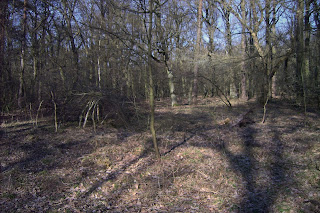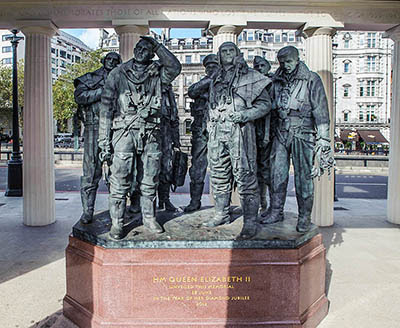March 8, 1945 - Aftermath
 |
| The crash site in Colbitz. Source: http://www.550squadronassociation.org.uk/ Image provided to the association by German researcher Jorg Helbig |
Rear air gunner Douglas Hicks, air bomber Gordon Nicol, wireless operator Gerard Kelleher and navigator David Yemen parachuted to safety. Hicks described the events:
As I lay on the ground in this freshly plowed farmers field in Germany I congratulated myself for the successful parachute jump. My whole inner being become totally relaxed and I felt that I could just lay there and drift off to sleep. I looked up at the starry sky and the sparse moonlight from a waning moon. Just then I heard the sound of an aircraft flying overhead with the distinctive German sound. I speculated that maybe this was the aircraft that had shot down our Lancaster. My relaxation was so complete that I seriously felt that I could easily drift off to sleep.
At the top of my mind was what would soon be happening at home, my mother would receive word that I was missing in action and that no word was forthcoming as to my status. I wished that there was some way that I could get some word to her that I was safe in Germany and that there was no need to worry. Then the realization of the situation struck home. I was aware that I had some kind of injury, my forehead felt tight and when I touched it with my hand it reminded me of the skin on a roasted chicken. I was carrying an emergency First Aid kit and opened it and removed the burn ointment, I applied it liberally to my forehead.
I then stood up and looked around the farmers field, I was only a few yards from a road and looking in the distance I could see searchlights combing the night sky, I decided that I would walk down the road to the searchlights and as it was no doubt a military installation I would turn myself in. There was a nagging suspicion in my mind that the burns may be more serious than I could determine. I disconnected my parachute harness, the silk canopy was spread out to its full length behind me. Training told me that I should bundle up the parachute and make sure it was well hidden. I started to drag it together and then said to myself, just leave it there and maybe some German would find it easily and be able to make use of the silk.
I started to walk down the road with the searchlights as my beacon to follow. Some five minutes later the searchlights turned off and my homing beacon disappeared. I continued down the road and came upon a small village. The air raid was over and the inhabitants had come out of their house to see that all was well and to discuss the events with each other. This was perhaps one of the few times that an air raid had been called at their village. When they spotted me walking into the village they were more than surprised and looked at me in amazement. They talked among themselves and then spotting the Canada patches on my uniform, they repeated Canada, Canada and then pointed up to the sky asking me in German if that was where I came from. Somehow, although I knew no German I was able to ascertain most of what they [were] saying. I guess my arrival was big doings for the town and someone ran to get the mayor, or someone of importance to ask for guidance as to what they should do. After a lot of discussion I was taken to the local jail and placed in a small cell. This appeared to be a small military office with one jail cell. I was given a small, very small blanket and left for the night. I then took stock of the situation and now read the instructions on the burn medication that I had taken out of my emergency First Aid kit, there in big letters were the admonition “keep away from your eyes.” Now there was something else to worry about. I took the small blanket and laying down on the wooden bench I tried to get some sleep. This was not to happen, as the night was chilly and the blanket was too small to cover me. I spent a fitful night and at no time did any of the garrison attempt to talk to me or provide any solace or nourishment. I don’t know what I had expected.
When morning came I was visited by a German officer in the traditional leather jacket of what I would call the S.S. He asked me many questions in their loud guttural style. He was angered by the fact that I did not know what had brought our aircraft down, flak or a night fighter. The interview was in English and it seemed that this was not the first Allied airman that he had interrogated. When I asked if he had word on the aircraft or the rest of the crew he replied negatively. I supposed that I was the first of my crew that he had talked to. Later that day I was taken to another facility where I met up with other members of my crew. Before the day was out the four survivors of a crew of seven were united under the Prisoner of War status.

Comments
Post a Comment